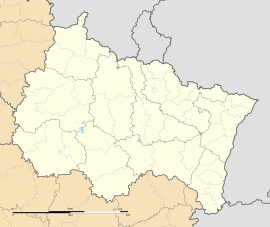Braux, Aube facts for kids
Quick facts for kids
Braux
|
||
|---|---|---|
|
||
| Country | France | |
| Region | Grand Est | |
| Department | Aube | |
| Arrondissement | Bar-sur-Aube | |
| Canton | Chavanges | |
| Intercommunality | Chavengeois | |
| Area
1
|
15.21 km2 (5.87 sq mi) | |
| Population
(1999)
|
121 | |
| • Density | 7.96/km2 (20.60/sq mi) | |
| Time zone | UTC+01:00 (CET) | |
| • Summer (DST) | UTC+02:00 (CEST) | |
| INSEE/Postal code |
10059 /10500
|
|
| 1 French Land Register data, which excludes lakes, ponds, glaciers > 1 km2 (0.386 sq mi or 247 acres) and river estuaries. | ||
Braux is a small commune in the Aube département, located in the north-central part of France. A commune is like a small town or village, and a département is similar to a county or region. Braux is known for being a quiet, rural area.
About Braux
Braux is a peaceful place in the French countryside. It's part of the Aube département, which is in the Grand Est region of France. This area is known for its beautiful landscapes and calm atmosphere.
Where is Braux?
Braux is located at about 48.48 degrees north latitude and 4.47 degrees east longitude. It sits at an elevation of around 127 meters (about 417 feet) above sea level. The total area of the commune is 15.21 square kilometers (about 5.87 square miles). This makes it a relatively small area, perfect for a quiet community.
People of Braux
According to the 1999 census, Braux had a population of 121 people. This means it's a very small community, where neighbors likely know each other well. Small communes like Braux often have a close-knit feel.
Local Government in Braux
Like all communes in France, Braux has its own local government. The mayor is the head of the commune. From 2001 to 2008, the mayor of Braux was Raymond Doublet. The mayor is responsible for managing the daily life of the commune, including local services and community projects.
Braux is also part of an "intercommunality" called Chavengeois. This means Braux works together with other nearby communes in the Chavengeois area. They team up to share resources and manage services that benefit all their communities, such as waste collection or public transport. This cooperation helps small towns achieve more together.
See also

- In Spanish: Braux (Aube) para niños
 | James B. Knighten |
 | Azellia White |
 | Willa Brown |




